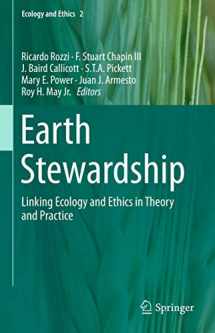
Earth Stewardship: Linking Ecology and Ethics in Theory and Practice (Ecology and Ethics, 2)
Book details
Summary
Description
This book advances Earth Stewardship toward a planetary scale, presenting a range of ecological worldviews, practices, and institutions in different parts of the world and to use them as the basis for considering what we could learn from one another, and what we could do together. Today, inter-hemispheric, intercultural, and transdisciplinary collaborations for Earth Stewardship are an imperative. Chapters document pathways that are being forged by socio-ecological research networks, religious alliances, policy actions, environmental citizenship and participation, and new forms of conservation, based on both traditional and contemporary ecological knowledge and values. “The Earth Stewardship Initiative of the Ecological Society of America fosters practices to provide a stable basis for civilization in the future. Biocultural ethic emphasizes that we are co-inhabitants in the natural world; no matter how complex our inventions may become” (Peter Raven).


We would LOVE it if you could help us and other readers by reviewing the book
Book review



